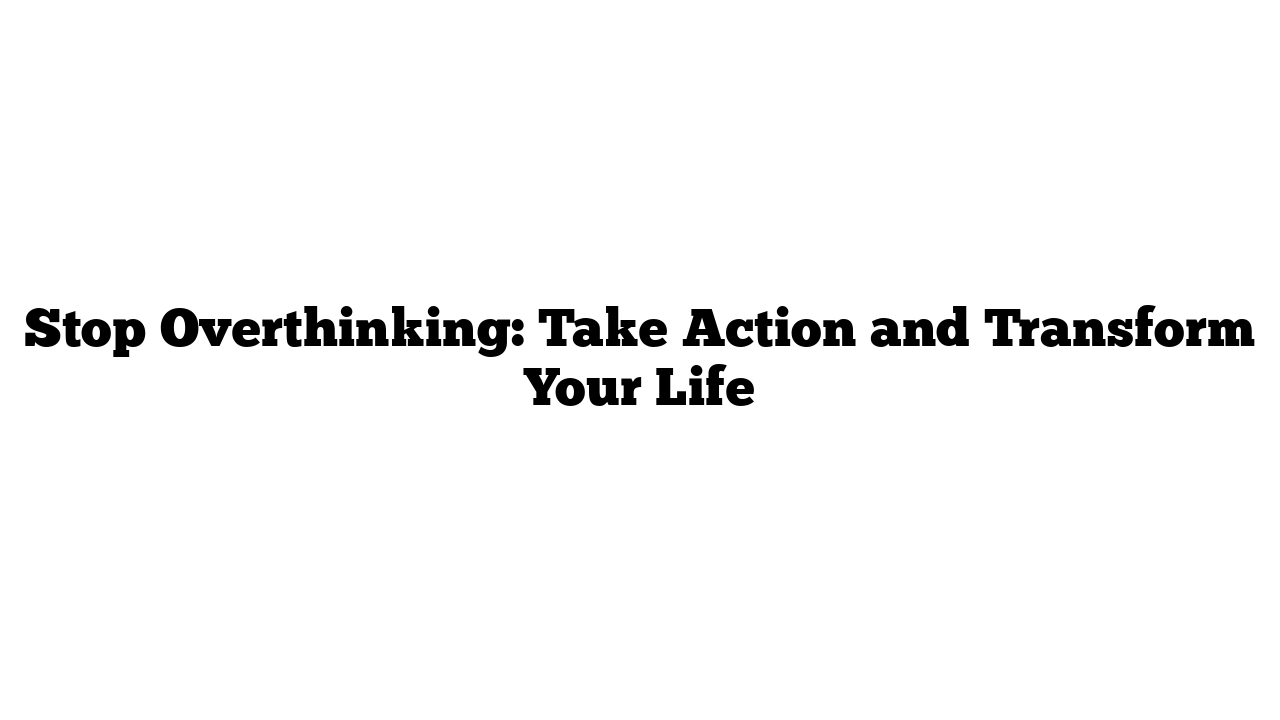Do you know that 3:00 a.m. feeling? You’re lying in bed, mind racing with a thousand “what-ifs” and “maybes.” It’s a frustrating loop, right? You’re not alone—I’ve been there too. Overthinking is like an invisible anchor holding us back. But here’s the good news: you can break free.
Let me share a personal story.
Last year, I spent six months planning to start a podcast. Six months researching microphones, reading about audio editing, drafting outlines… and yet, I never recorded a single episode. Why? I was so consumed by making it perfect that I didn’t actually do it. Sound familiar?
The truth is, overthinking feels productive, but it’s just fear in disguise. It’s our brain’s way of shielding us from potential failure, rejection, or embarrassment. However, instead of protecting us, it often paralyzes us.
The Wisdom That Changed My Life
A conversation with my grandfather changed everything. He said something so simple yet so profound:
“Life is like jumping into a pool. You can test the water, check the depth, and calculate the perfect angle—or you can just jump in. Either way, you’re going to get wet.”
This hit me hard because he was right. Most of the scenarios we imagine in our heads never happen. Our brains are brilliant storytellers, spinning wild tales of disaster, but reality is usually far less dramatic.
The Two-Minute Rule for Taking Action
Here’s a game-changing secret I’ve adopted: the two-minute rule of action.
When you catch yourself spiraling into overthinking, give yourself just two minutes to decide. Not two hours, not two days—just two minutes. Why? Because in that short time, you rely on your instincts, the part of you that already knows what to do.
And here’s the magic: action creates clarity.
Think of trying to steer a parked car—it’s impossible. But once the car starts moving, steering becomes effortless. Life works the same way. You don’t need to see the entire staircase; you just need to take the first step.
Why Done is Better Than Perfect
When I finally recorded my first podcast episode, I didn’t have fancy equipment. I simply used my phone’s voice recorder and started talking. Was it perfect? Absolutely not. But it was real. It was done. And that imperfect first step taught me more than six months of planning ever could.
Perfectionism is just procrastination in disguise. It’s an excuse to avoid action because we’re afraid of falling short. But the truth is, progress beats perfection every time.
Strategies to Stop Overthinking and Start Doing
So, how do you stop overthinking? Here’s what works for me, and I believe it can work for you too:
1. Recognize Perfectionism for What It Is
Ask yourself, “Will this matter in five years?” If the answer is no, give yourself permission to make an imperfect decision.
2. Set Ridiculously Short Deadlines
Want to write a blog post? Give yourself 30 minutes. Need to make a decision? Do it before your coffee gets cold. These tight deadlines force your brain to focus on action rather than endless analysis.
3. Embrace the ‘Done is Better Than Perfect’ Mindset
There’s a big difference between excellence and perfectionism. Excellence is about doing your best with what you have; perfectionism is about paralysis.
Take my friend Sarah as an example. She spent three years crafting the perfect business plan. Meanwhile, her competitor launched a “good enough” version, learned from real feedback, and built a thriving business. Today, Sarah’s plan still sits untouched, while her competitor’s business is booming.
Why Action is the Antidote to Anxiety
Overthinking isn’t just mentally exhausting—it’s a thief of time. Every moment spent imagining worst-case scenarios is a moment you’ll never get back. But here’s the kicker: action cures anxiety.
When you’re doing, you’re not overthinking. It’s that simple.
Your Challenge: Take Imperfect Action Today
What’s one thing you’ve been overthinking? Sending that email? Making that phone call? Writing that first paragraph? Whatever it is, I challenge you to take action today—right now.
Remember:
“You don’t have to be great to start, but you have to start to be great.”
Life isn’t a dress rehearsal. It’s happening right now, and while you’re stuck in your head, it’s passing you by.
Jump into the pool. Take that messy, imperfect first step. Because on the other side of overthinking lies freedom.
Reference websites:
- Visit medicaltimes.io for more actionable life advice.
- Learn more strategies from Psychology Today.
- Discover practical tips on productivity from MindTools.
- Explore habit-changing techniques at James Clear.
FAQs
1. Why do I overthink so much?
Overthinking is often rooted in fear—fear of failure, rejection, or making the wrong decision. Recognizing this can help you take the first step toward action.
2. How can I stop overthinking instantly?
Use the two-minute rule: give yourself two minutes to make a decision and act on it.
3. Is overthinking a mental illness?
While overthinking itself isn’t a mental illness, it can be linked to anxiety disorders. If it’s overwhelming, consult a mental health professional.
4. Does overthinking affect productivity?
Yes, overthinking can lead to analysis paralysis, where you’re so caught up in planning that you don’t take action.
5. What are the benefits of taking action?
Action leads to clarity, reduces anxiety, and allows you to learn and grow from real experiences.
6. How can I stop being a perfectionist?
Shift your mindset from “perfect” to “progress.” Understand that done is better than perfect.
7. What’s the first step to overcoming overthinking?
Acknowledge it. Recognize that overthinking isn’t helping you and commit to taking small, imperfect actions.
8. Can overthinking cause stress?
Yes, overthinking often leads to unnecessary stress and anxiety, as it focuses on potential negative outcomes.
9. How do deadlines help reduce overthinking?
Short deadlines create urgency, forcing you to act instead of overanalyzing.
10. What’s the best way to start a task you’ve been avoiding?
Break it into smaller steps and tackle the first one immediately, even if it’s imperfect.
